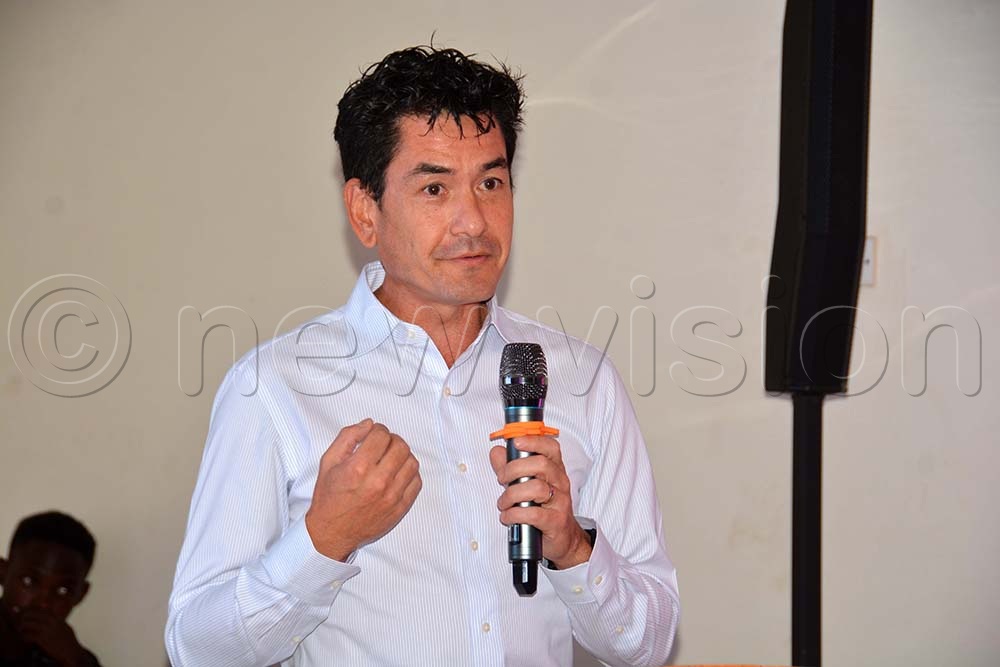'Over 5,000 PWD households gain access to govt programmes'
Ogalo said the milestone was the result of years of community mobilisation, lobbying, and capacity building of Organisations of Persons with Disabilities (OPDs) and Civil Society Organisations (CSOs).
The deputy Program manager ZOA Joyce Patricia Okwir (second left) interacts with (L-R) Sarah Nabaasa NUDIPU human resources, Frederick Echeku communications officer ZOA and John Panga country director ZOA during the persons with disabilities workshop organised by NUDIPU at Hotel Africana in Kampala. (Credit: Francis Emorut)
Head of Programs See You Foundation Netherlands Japer Oei addressing participants during the persons with disabilities workshop organised by NUDIPU at Hotel Africana in Kampala.(Credit: Francis Emorut)
More than 5,000 households of persons with disabilities (PWDs) in Uganda have accessed government livelihood and social protection programmes, a milestone hailed as a turning point in breaking barriers that have long excluded PWDs from national development.
The achievement was highlighted by Robert Ogalo, the country's global coordinator of We Are Able! (WaA!) programme, at the official closure of the five-year initiative that has championed disability inclusion across six African countries: Uganda, Burundi, South Sudan, Sudan, Ethiopia, and the Democratic Republic of Congo.
Ogalo said the milestone was the result of years of community mobilisation, lobbying, and capacity building of Organisations of Persons with Disabilities (OPDs) and Civil Society Organisations (CSOs).
He said these groups have pushed for inclusive food security policies and ensured PWDs are not treated as passive beneficiaries but as equal rights-holders.
“Many thousands of people with disabilities, caretakers, and community members are now accessing land, food, and employment in the value chain not as a donation or charity but as a right,” said Ogalo at Hotel Africana on Friday (September 26) to a group of PWDs from different parts of the country.
According to the 2014 Uganda National Population and Housing Census, about 12.4% of Ugandans live with some form of disability.
This translates to nearly six million people today, many of whom face discrimination, poverty, and barriers to accessing education, healthcare, and employment.
Unemployment among PWDs remains disproportionately high, with the National Union of Disabled Persons of Uganda (NUDIPU) estimating that over 80% are under- or unemployed. Social stigmas and inadequate accessibility further deepen their exclusion.
Government has over the years introduced several programmes to address this, including the Special Grant for PWDs, which provides seed capital to groups of PWDs at the district level, the Social Assistance Grants for Empowerment (SAGE) under the Expanding Social Protection Programme targeting vulnerable older persons and PWDs, and access to credit through the Parish Development Model (PDM), with a provision that at least 10% of funds be allocated to PWD households.
While these interventions exist, gaps in awareness, weak implementation, and corruption have often prevented PWDs from fully benefiting. Then came in WaA!, which pushed for stronger accountability and inclusion.
Launched in 2021, WaA! was built around three pathways of change. The first was community mobilisation, reducing stigma through participatory planning and savings models.
The second was strengthening OPDs and CSOs by building resilience, advocacy skills, and organisational structures.
The third was policy influence, pushing for inclusive governance, participatory budgets, and food security policies.
Ogalo said that, through this approach, OPDs in Uganda developed sustainability plans, trained inclusive governance co-trainers and disability facilitators, and worked with local governments to embed food security and disability inclusion in sector plans.
Notably, Uganda ratified the African Disability Protocol (ADP) during the WaA! Programme period, strengthening its legal framework for disability rights alongside the UN Convention on the Rights of Persons with Disabilities (UNCRPD).
The programme also built partnerships with global and regional networks such as Right2Grow, the Netherlands Food Partnership, She Leads, JISRA, and Food4All, ensuring the disability agenda was not isolated but part of broader development strategies.
Ogalo said for years, PWDs were sidelined from decision-making tables, especially in agriculture and food security, adding that the WaA! Programme has changed that narrative by ensuring their participation in budgeting and governance processes.
He noted that in several districts, PWD representatives now sit on planning committees, ensuring agricultural extension services, access to land, and credit schemes take disability into account.
Ogalo emphasised that this transformation is not about charity but justice. “This closure is not an end, but a call to action, what is possible when equity, dignity, and courage lead the way.”
As Uganda continues rolling out the PDM and other livelihood programmes, the inclusion of PWD households is expected to deepen.
Experts argue that sustaining the gains will require continued investment in OPDs and CSOs, strengthening accountability, and addressing entrenched discrimination at community level.
The WaA! programme leaves behind strengthened structures, trained facilitators, and empowered communities determined to carry forward the disability inclusion agenda.
Ogalo said, “From policy rooms to farming fields, the We Are Able! Programme has broken down barriers and opened opportunities for persons with disabilities to fully participate in decisions that help achieve inclusive food security, a dream that for too long was distant.”
Food security
Agnes Kirabo, the executive director of the Food Rights Alliance, said the government has done its best, but it should carry the impact, noting that food is a human right.
“It is a great opportunity for these people. So, all districts should develop food security to make sure no one is left behind,” she said.
Doreen Kobusinge from the Land Coalition Uganda said a lot more needs to be done on top of what the government has already done to support PWDs.